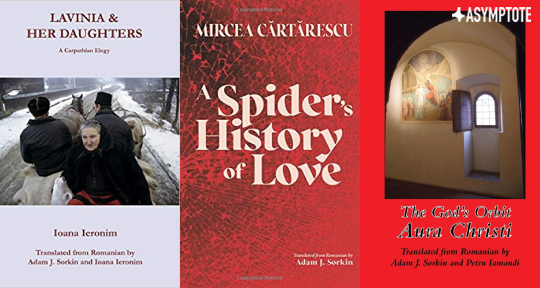“All Romanians are born poets,” goes a local saying, but far too few are published in English. Among their faithful champions, award-winning translator Adam Sorkin stands out: while some of us forwent productivity in favor of survival this year, he managed to put out a whopping three Romanian poetry translations. In times of collective confinement, they fittingly tackle the self’s relationship to space: the city, the countryside, the foreign land. They hone in on different forms of love and fear, too, from the romantic to the maternal to the religious—the love and fear of God. Beyond these and other commonalities, however, they differ in structure and style: the first is an emotional bildungsroman, the second an epic, the third a hymn of sorts. This formal range attests to Sorkin’s chops, which Assistant Editor Andreea Scridon is only too happy to extol.
It’s always contentious to name someone the best translator of a language, a claim that is perhaps more trouble than it’s worth. I, for one, tend to shy away from such absolutisms, but Adam Sorkin gives me second thoughts. Undeniably, he’s at the top of his game, having published over sixty books of Romanian poetry in English translation (even in the year of the plague, he’s managed to publish several).
Of the three most recent ones—Mircea Cărtărescu’s A Spider’s History of Love, Ioana Ieronim’s Lavinia and Her Daughters, and Aura Christi’s The God’s Orbit—I must admit I’ve only read the first in the original (among contemporary authors, Cărtărescu is a firm favorite of mine, so the stakes were especially high). All three, however, merit attention.
I have no interest in writing a sycophantic or fawning piece; in fact, I would be embarrassed to be so generous with praise if I didn’t feel that Sorkin’s corpus demonstrated exceptional verve and dedication—two especially valuable traits in a sometimes thankless publishing industry that doesn’t necessarily have an interest in promoting a minor language. To put it simply, having worked with Sorkin myself, I knew he wouldn’t disappoint.
A Spider’s History of Love was published by New Meridian Arts in July, making it the first of three Cărtărescu books to come out in English around this time (Solenoid, translated by Sean Cotter, will be published by Deep Vellum in 2022, and Nostalgia, translated by Julian Semilian, is forthcoming from Penguin in 2021). The book’s title is Sorkin’s doing, a phrase he took from a poem included in the volume, which encompasses selections from multiple collections; these are curated into three sections, entitled “Once I Had . . . ,” “Bebop Baby,” and “Prisoner of Myself.”
Considered cumulatively, these poems do not seem to represent an overarching epic odyssey in the same obvious way that Ioana Ieronim’s Lavinia and Cărtărescu’s own Levantul do; rather, they resemble an emotional bildungsroman with porous boundaries, entirely dictated by the inner life of the poetic narrator as he bends, with force and delicacy, the world to his perception, and not vice versa.
In “Once I Had . . .” and “Bebop Baby,” the microcosm of the poet’s Bucharest serves as the stage for various amorous pursuits. With obvious erudition, indicated by winks to his forerunners in Romanian literary history, Cărtărescu combines Romantic and Levantine elements with communist shabbiness. Thus, contemporary banality, even poverty, are seen through an euphoric eye and become savoury for those who understand how to look the right way, thanks to the poet’s almost rabid attention to detail:
. . . and deep down in the digestive tract I could spy
death herself.
I saw her leaning against the iron fence of the TB hospital next to the police headquarters
stopping a kid on the sidewalk to send him to fetch a newspaper or a fresh bun
and I saw her shopping for bread and newspapers in the pinkest, most incomparable
xxxxxxxxxsunset.
(“Love Poem”)
Everything becomes effervescent and iridescent for this narrator, a master of the art of sublimation, who seems to be eternally in love. His are confessional narrative poems—a form which suits the sentimental experience, with its varied shades and seasons. Long as they may be, they read quickly, engaging with reality and avoiding excessive abstraction. The rhyme is ingenious thanks to both the author and the translator (“. . . the evening / deposited thin sheets of lapis lazuli / the parked cars seemed folded from tinfoil and smelled of patchouli”; “. . . and your figure reminds me so little of aesop / that I wrote you a bebop”). READ MORE…


